His eye may be on you or me
Who will he bang?
We shall see, oh yeah!The Man with the Golden Gun (1974). Music: John Barry, Lyrics: Don Black.
And so we come to our 100th post. Time to crack open the Widow, a bottle or three. Scrolling back through the archive, our very first post was Michael Reeves' Witchfinder General (1967), published on the 6th of December 2023 — a year ago to this day. It now seems like a very long time ago. Why Witchfinder General? Well, because a) I like it, and b) because it's a once-forgotten B-movie with recently acquired cult status. For some unfathomable reason, Witchfinder General excites the film nerds (conveniently, Michael Reeves died at the tender age of twenty-five), with one critic going so far as to describe it as "one of the most personal and mature statements in the history of British cinema"— a quote, which, as much as I still enjoy the film, raises a manicured eyebrow, Roger Moore style.
Anyway, since those halcyon days, we've come a long way — thanks to the readership. The subscriber count is now heading towards the Big One Thousand. Thank you all. The idea, which, like all the best ideas, came to me in a hot bath, was that WEEKEND FLICKS. should be something that I would be happy to read myself: something to look forward to every weekend: a feel-good affair, like the old London Weekend Television ident, when, every Friday afternoon Tea-Time, earnest Thames Television handed over to the racier, yet comforting, LWT. Like the Gold Standard, the (as yet untampered with) Lea & Perrins label, or Changing the Guard at Buckingham Palace, one knows that all will be right in the world.
Which takes us to — roll of drums — The Man with the Golden Gun (1974), our 100th film recommendation. I adore The Man with the Golden Gun; it's one of my favourite Bonds, not because it's any good especially — it ain't — but because it's amusingly tacky and, above all, fun. And fun is what WEEKEND FLICKS. is all about. Even when we're discussing Solaris (2002) or Charles Chaplin’s The Kid (1921) — two of my least successful posts. WEEKEND FLICKS. also gives me the excuse to write about random stuff, especially history. You might call it serendipity.
I'm covering the earlier Bond films (in no particular order), partly ‘cos I find them amusing and partly because it's a subject everybody and anybody seems to have a definitive opinion about. That said, I'm not sure I can bring myself to write about any Bond film made after The Man with the Golden Gun (1974). This wundewerk has to be the last gasp, the fag-end of Fleming's original creation: before invisible cars, BMWs, Casio watches (as much as I admire their design), and skin-huggin' Tom Ford suits — altho' strangely the dark, chain-smoking, broody Milk Tray Man which is the Shakespearean Timothy Dalton, has to be one of the best Bonds.
Forget the dismal For Your Eyes Only (1981), by Live and Let Die (1973) Bond’s finished. Kaput. Dead as a Dodo. The film's title is more appropriate than the producers realised. The Bianca-Tate murders, Vietnam, the Oil Crisis, Watergate, British Imperial and Economic Decline, Edward Heath’s Three-Day Week: by the 1970s, Britain and America had changed (as with today, a collapse in confidence). Suddenly, Bond was a dinosaur, more Stegosaurus than Stenosaurus, countered with supposed 'irony' and bar-propping 'humour': a cringy, blow-dried quip here or a naff Union Jack parachute there. Fleming’s original creation dates to 1953. When Britain still ruled the waves, sort of. At the Queen’s Coronation Fleet Review, held at Spithead in 1953, the Royal Navy fielded 197 warships (these were the days when we still had both a Home and a Mediterranean Fleet) plus a further thirteen from the Commonwealth, and overhead, and across the water, flew the Fleet Air Arm — for in the late 1940s and 1950s, Britain led the world in jet aviation.
Fleming's Bond was a Bulldog Drummond for the post-war world and all that came with it: when, pre-Suez, Britain still aspired to imperial ambition, despite the loss of India. Step forward Commander John Kerans RN, DSO (the star of HMS Amethyst) as portrayed by a lantern-jawed Richard Todd in the Yangtze Incident (1957) and the subject of Nigel Farndale's stirring mini-biography, Last Action Hero of the British Empire (2001), a slim, rather elegant volume which comes with my recommendation.
And British Hong Kong is an appropriate, Fleming-esque setting for The Man with the Golden Gun, a place in time for which I have affection, admiration and fascination. Indeed, it’s the first stop in Ian Fleming’s Thrilling Cities (1963). On my first visit to Hong Kong (before the 1997 handover) I spent several evenings in the Captain’s Bar at the Mandarin Hotel, a lonely Dry Martini as company, and the select clientele (over that time) included: Yours Truly, a Chanel-clad tart, two Alan Whicker types in double breasted blazers and a bowl of salted peanuts. In the 1970s, my late father advertised Cathay Pacific Airlines, owned by the Swire Group — one of the old Hong Kong trading corporations run by the Taipans. Like Jardine Matheson, which, during the 1840s, made their money flogging (or, in the case of Swire, transporting) opium (which the East India Company grew in Bengal) to the poor, newly-addicted peoples of Imperial China — whose government, alas, was too weak and ineffectual to prevent it, as hard as they tried. It's not one of our greatest moments — even by the standards of the day.
Still, 1970s Hong Kong had something about it, despite the regrettable lack of democracy (with Communist China breathing down our neck, a cruel necessity of realpolitik, especially as China controlled the water supply), a thriving, stylish, rollicking, buccaneering, libertarian Jewel in the Crown, with much going for it. I was struck by its energy, vitality, wealth, the glittering skyscrapers and the sheer size of the place. Hong Kong Island, Kowloon, the New Territories and the remaining 263 (or so) islands make a territory about the size of Cornwall. Back on the shabby streets of Blighty, your average punter was indifferent, oblivious to the reality — as if Hong Kong were some sort of tiny Gibraltar! And yet, this 'Pearl of the Orient' was very much an original Anglo-Cantonese creation, something I think we can still be proud of (despite the civil unrest of the 1960s), a Temple to Capitalism led by a 'relatively benign' British administration, and populated with a proud, hard-working Hong Kong people: a safe haven for dissidents and political refugees escaped from the Maoist regime.
For The Man with the Golden Gun is (most probably) politically incorrect. But then Bond is politically incorrect. The whole flippin’ shooting match is politically incorrect. It’s its raison d’etre. And Bond is also undeniably naff. Here’s Our Lulu leading the way with The Man with the Golden Gun’s theme song, a song boasting the most poetic lyrics in all movie history:
He has a powerful weapon
He charges a million a shot
An assassin that's second to none
The man with the golden gun.Lurking in some darkened doorway
Or crouched on a rooftop somewhere
In the next room, or this very one
The man with the golden gun.Love is required, whenever he's hired
It comes just before the kill
No one can catch him, no hitman can match him
For his million dollar skill.
I mean, you couldn't make it up. What else is there to like about it? Roger’s Cyril Castle suits, for one. And his Frank Foster shirts, with the cocktail cuffs. And Maud Adams. She's the epitome of sophisticated Seventies womanhood. Maud's gorgeous. And Britt Ekland's cute. Infinitely preferable to the brassy scrubbers of Diamonds Are Forever (1971). And the locations are to die for. For as we've already established, 1970s British Hong Kong is incredibly Bond: brown suede and Kung Fu, Golden Buddhas and Jade. Priceless antiques (often fake), Sam's Tailors and the Dragon Bar at the Hong Kong Hilton. All reminiscent of the packaging for Mandate aftershave — in all its ersatz sumptuousness: a champion of sinful luxury, a noble cause which, like sunken baths and golden dragon taps, reminds me of the Crown Colony during that glittering decade: the gilt font set against simulated marbled cardboard in decadent chocolate brown; the glass bottle reminiscent of an Archaic Chinese bronze.
And what else? There's a demented dwarf by the name of Nick Nack (Hervé Villechaize), that's what. Described by Roger Moore as, I quote, "a sex maniac with unnatural lusts", Villechaize, it is said, slept with thirty-five women during the making of The Man with the Golden Gun. And there's a third, rather revolting, plastic nipple. Scaramanga's nipple. Despite this aesthetic unpleasantness, Christopher Lee nails it. Nicely urbane. As, of course, only Christopher Lee can be. And there's a fairground or circus thing going on, too — when Scaramanga puts Bond through a sub-Versailles Hall of Mirrors. Very early 70s, that. A hangover from the psychedelic late 60s: the obsession with Coney Island, amusement arcades and the like. You find this in episodes of The Prisoner (1967-8), later episodes of The Avengers (1969), Sleuth (1972) and Kojak (1973). But, then perhaps, the only snag to this magnificent cinematic oeuvre is the fresh outbreak (like a bad smell that won't go away) of that tiresome American policeman with the pot belly. The one from Live and Let Die (1971). Considering that 63.2% of Americans are rumoured not to possess a passport, I'm not sure what he's doing in Thailand, a country the producers appear to confuse with Hong Kong. But then I'm allergic to 'characters'. It's the same with television antique dealers. One of the reasons I avoid polka-dot bow ties, glasses on loops and checked bookmaker's suits.
I watched The Man with the Golden Gun (1974) on DVD. And it’s also available on Blu-ray and Amazon Prime digital download, although I suspect it may come with a ‘this motion picture contains content some viewers may find distressing’ warning.
Right. Christmas. Looking ahead, I’ve got all sorts of Christmas goodies up my sleeve, a cracking line up, starting this Sunday. As it’s our 100th anniversary, I’ve made today’s post free for everybody to read — but I’m also planning bonus Christmas content for the paid subscribers, which I may well put up in the middle of the week. So be prepared.
In the meantime, a quick recap: there are two options on Luke Honey’s WEEKEND FLICKS. Cinema for Grown Ups: ‘Paid-for’ subscribers get an extra exclusive film recommendation every Friday morning, plus full access to the complete archive.
It costs £5 a month (or £50 a year) — a bargain, frankly, when you compare it to a few cups of coffee, a packet of semi-legal gaspers, or a pint of beer in the pub. ‘Free’ subscribers get access to the Sunday newsletter, plus the ‘free subscriber’ films in the archive. Either option is a good bet. And when I get my act together, I’m planning to add a spoken voiceover (mine!) for paid subscribers. That’s for the New Year.
I’ll be back on Sunday with the first of our all-time Christmas classics — and it’s a serious weepie, folks, so handkerchiefs at the ready. Put it this way, it reduces me to a sobbing, blubbering wreck. In the meantime, sit back, mix a warming Whisky Sour — and have a relaxing and cinematic Friday. Until Sunday, Adios.

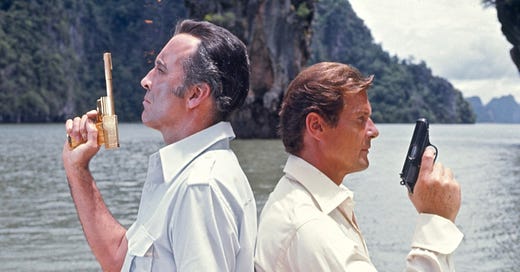




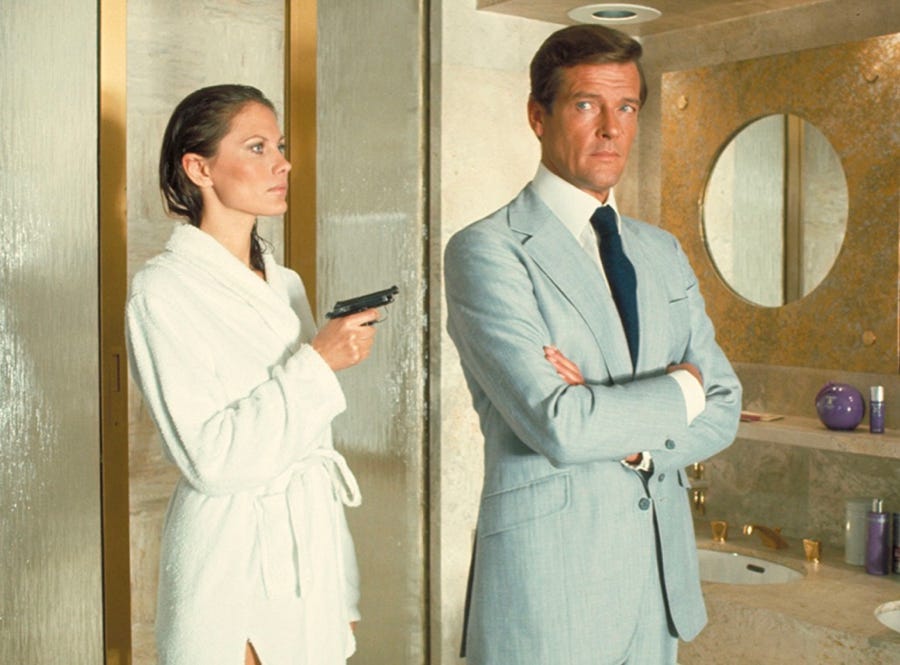
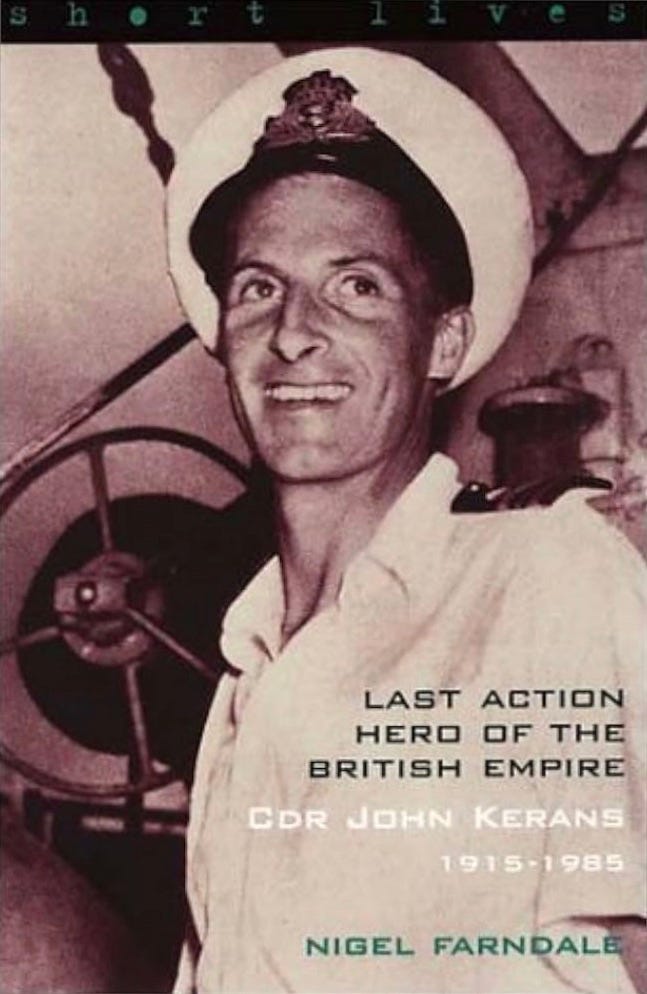
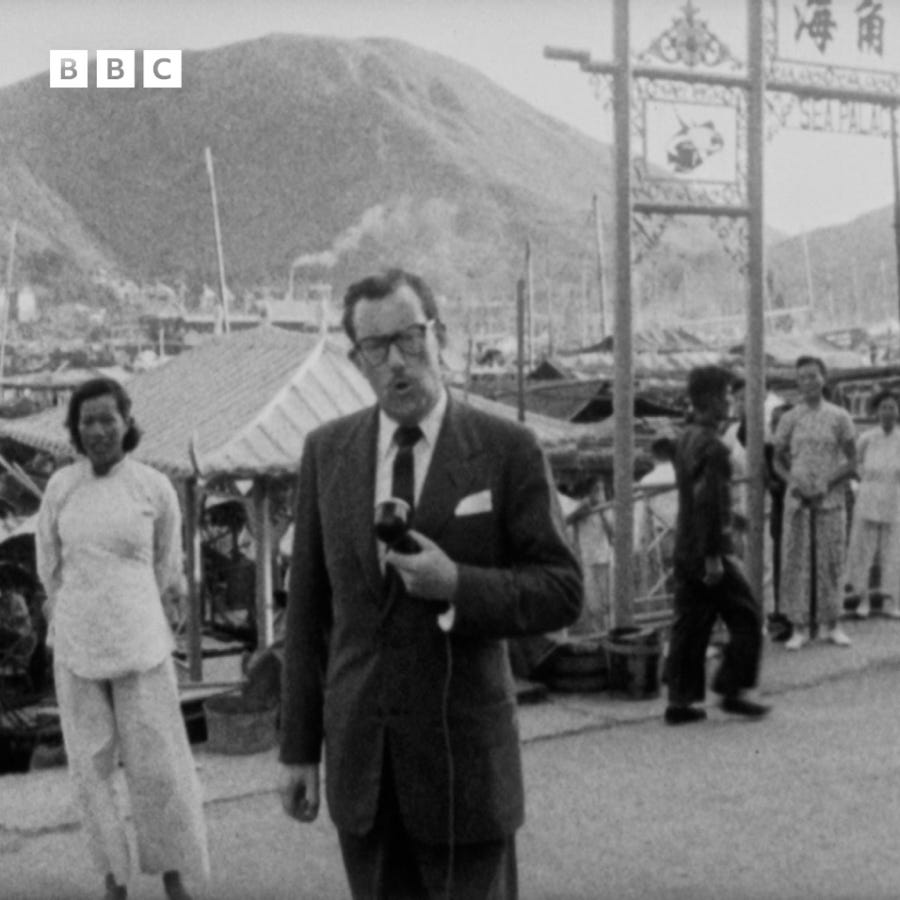

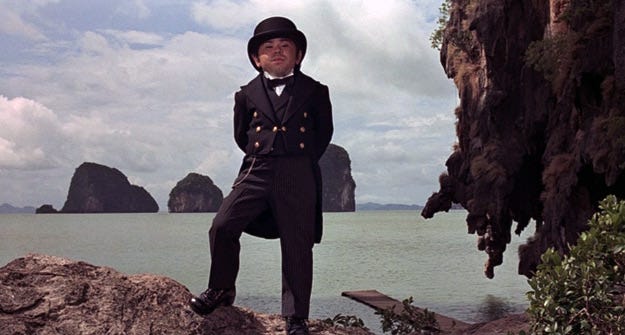
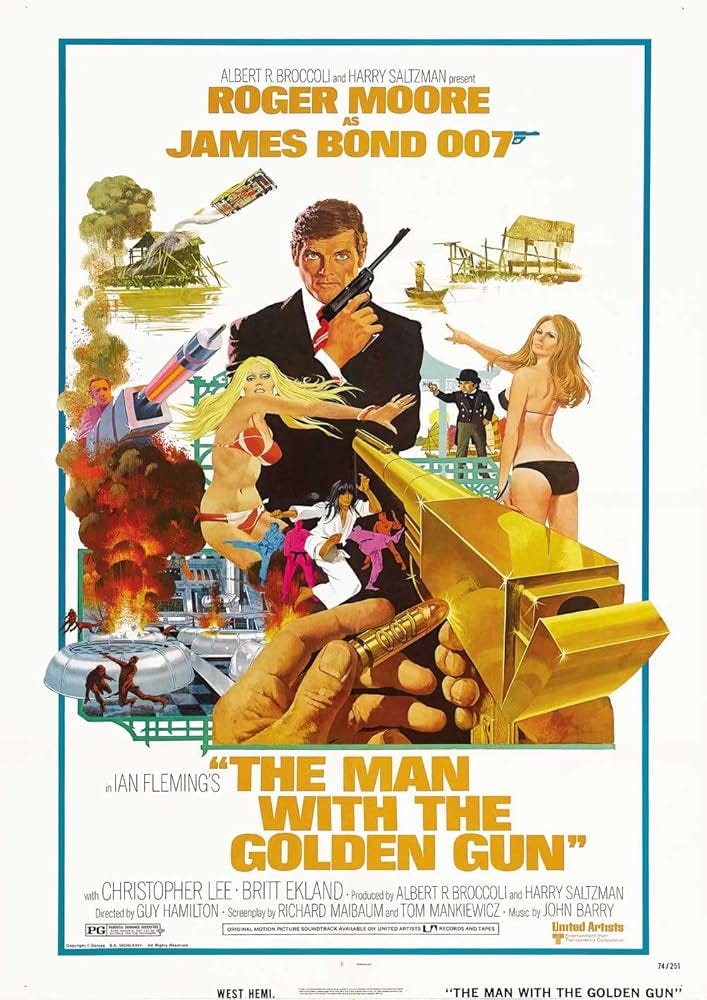
Happy 100!
But you missed out my favourite banal, concluding line from John Barry's theme:
'The man with the golden gun
Will get it done...
With his golden gun'
The whole saucy mess of which is practically a single-entendre.
It was high time they gave Lulu a Bond theme. And this has to be the last of the classics, albeit one with a twist as cynical as Roger's eyebrow.
Fleming and Lee were related. Both saw active service inww2. Fleming in Naval Intelligence and Lee in SOE. That's why this is one of the best Bond films. Authenticity.